Brad Kearns
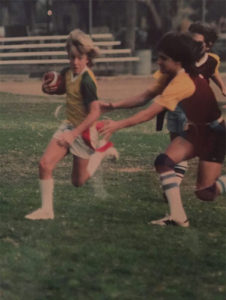 I recently discovered my second grade report card in a box in my mom’s attic. In the comments, the teacher wrote, “Bradley is a bright student, but tends to distract the other children and disrupt class.” I kinda freaked out because those characterizations played out in middle school, high school, and into adult life as well. Here I am distracting you with this meandering “Meet Brad” message! I’m an athlete, author and podcast host interested in ancestral health, athletic peak performance, and how to live a long, healthy, happy life. The description of my B.rad podcast says “covering health, fitness, peak performance, personal growth, relationships, happiness, and longevity, with humor and a little spice.”
Sports have been a centerpiece of my life since I was a kid. I had the good fortune of experiencing a childhood that predated the digital age, and it was filled with nonstop outdoor physical activity and adventure in the place known as Los Angeles, California. Okay, we were typically roaming air conditioned shopping malls instead of pristine forests or windswept coastlines, but at least we were active and creative.
My passion for sports was unpolluted by today’s disturbing influences of over-pressurized competitive environments and over-caffeinated helicopter parents. Left to nurture my own focus and competitive intensity (and influenced by awesome peers like future NCAA Div II All-American and World Junior Cross Country Team USA member Dr. Steve Dietch, as well as Dr. Steven “E” Kobrine and Dr. Todd Pearsons), I became an elite high school distance runner—12th in the National Junior Olympics 1500 meters at age 16, and 9th in the California State High School championship 1600-meter final in 4:19. Harboring big dreams upon arrival to UC Santa Barbara, my collegiate running career was a big, fat disaster. I was either sick or injured five seasons in a row before I finally walked away in disgust, hopped on a borrowed bicycle, rode my frustrations out for 103 miles back home to Los Angeles with no training, and turned my focus to the exciting new sport of triathlon.
I recently discovered my second grade report card in a box in my mom’s attic. In the comments, the teacher wrote, “Bradley is a bright student, but tends to distract the other children and disrupt class.” I kinda freaked out because those characterizations played out in middle school, high school, and into adult life as well. Here I am distracting you with this meandering “Meet Brad” message! I’m an athlete, author and podcast host interested in ancestral health, athletic peak performance, and how to live a long, healthy, happy life. The description of my B.rad podcast says “covering health, fitness, peak performance, personal growth, relationships, happiness, and longevity, with humor and a little spice.”
Sports have been a centerpiece of my life since I was a kid. I had the good fortune of experiencing a childhood that predated the digital age, and it was filled with nonstop outdoor physical activity and adventure in the place known as Los Angeles, California. Okay, we were typically roaming air conditioned shopping malls instead of pristine forests or windswept coastlines, but at least we were active and creative.
My passion for sports was unpolluted by today’s disturbing influences of over-pressurized competitive environments and over-caffeinated helicopter parents. Left to nurture my own focus and competitive intensity (and influenced by awesome peers like future NCAA Div II All-American and World Junior Cross Country Team USA member Dr. Steve Dietch, as well as Dr. Steven “E” Kobrine and Dr. Todd Pearsons), I became an elite high school distance runner—12th in the National Junior Olympics 1500 meters at age 16, and 9th in the California State High School championship 1600-meter final in 4:19. Harboring big dreams upon arrival to UC Santa Barbara, my collegiate running career was a big, fat disaster. I was either sick or injured five seasons in a row before I finally walked away in disgust, hopped on a borrowed bicycle, rode my frustrations out for 103 miles back home to Los Angeles with no training, and turned my focus to the exciting new sport of triathlon. 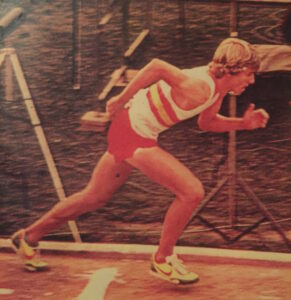
At the end of my senior year as a Business/Economics major at UCSB, a great tragedy occurred in my life: graduation. I was teleported from the beach ’n bike life at school into rush hour traffic in Los Angeles, working downtown for the world’s largest accounting firm (then known as Peat, Marwick&Mitchell; now called KPMG Lefty Mickelson.) I lasted 11 1/2 weeks at the firm before announcing my retirement to pursue a career as a professional triathlete. This was a ridiculous notion at the time, since the sport had little economic opportunity and I was (literally) miles behind the pros with my amateur race results to that date.
No matter, the sense of freedom and excitement I felt leaving the downtown LA high rise for the last time was one of the great moments of my life. I again went out and pedaled 100 miles the next day (this is known in the public accounting world as a “detox.”) On my new path, I was able to do what I loved every single day, again free from harmful influences like economic pressures, judgmental friends or family, nor FOMO (Fear Of Missing Out) or FOKU (Fear Of Keeping Up; Hey, Foku too!). I wasn’t even troubled by my pedestrian finishes at my first local professional races: I was overjoyed to pursue personal improvement and compete in the same field with the world’s best multisport athletes.
Every day was filled with hours of difficult workouts, napping, eating healthy foods, studying race results, plotting the travel and competitive schedule, and talking training and competitive strategy with my sidekick on the triathlon journey, Andrew MacNaughton. We dreamed of great success, fame and fortune, but we were consumed by a tremendous passion for the day-to-day experiences of being professional athletes. It was a simple, focused, and purposeful life that brought deep satisfaction and contentment, even when things were difficult, frustrating, or exhausting.
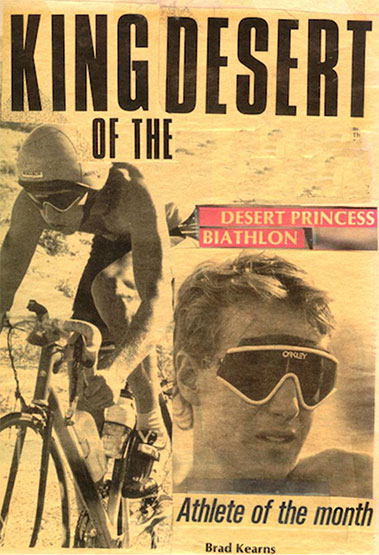
The race was surprisingly difficult, with the desert heat and brisk winds, and the unusually long distances of 10k run-62k bike-10k run. I started out at a sensible pace and let the marquee athletes and over-excited challengers quickly leave me in the dust. After the initial 10k run, I was 24th out of 27 pros–completely out of the picture. No matter, I mounted my bike in pursuit of personal excellence, maximum effort, and full appreciation of the experience. The Japanese call this “doryoku”; Americans call wannabe pros “delusional.”
Alas, my fighting spirit, personal focus, and ever-improving fitness enabled a fantastic bike performance. By the end of the 38-mile bike ride, I’d (unknowingly) passed everyone on the course! Running “like I stole something” for the final 10k, I broke a tape on the pro circuit for the first time. At the finish, I was swarmed by officials and media members, who were asking two main questions: “What’s your name?”; and, “Did you complete the whole course?!”
Six weeks later, there was a rematch race on the same course in the desert. With a target on my back and a proud display of race #1 on my body, I prevailed by the ridiculous margin of five minutes. This performance was chronicled in a magazine article titled, “King of the Desert.” These rookie year victories legitimized my aspirations of becoming a professional athlete, and teed me up for a 9-year odyssey on the global triathlon circuit.
Alas, the blissful disposition and pure motivation that facilitated my success in the desert was often swallowed up by the measuring, judging forces of the modern world, and also the realities of professional athletics as a business and the athlete as a brand (although we never said that word back then, geez.)
The allure of fixating on results would cause me to become influenced by pressure, ego demands, impatience, or greed. Instead of taking what my body gave me each day and being satisfied, I would force the issue and overtrain. This would lead me to breakdown, burnout, illness, and injury.
Then, through the painful and raw self-reflection that defeat forces upon you, I would eventually reconnect with my source of power and contentment: I was a young person (freed from the prison of the accounting firm high rise!) pursuing a dream, challenging my body every day to improve in three sports, and traveling all over the world to compete with the best. I’d take a break from heavy training and enjoy a vacation, then eventually “get up off the mat” (like my friend Johnny G says), get back into the groove and turn things around with some good results.

Re-immersion into real life was challenging (read my reflections in this article, “How To Retire At 30“), but I carried with me valuable character lessons learned through pushing my physical limits, overcoming my fears, and striving to accept both victory and defeat gracefully.
I have a maxim that sums up the most valuable attributes that I learned in the most intense and dramatic of competitive arenas that is athletics. It applies to all other peak performance goals I’ve pursued in life, such as parenting and career goals: Get Over Yourself—hence the original title of my podcast.
This describes cultivating a pure motivation for peak performance goals, releasing the attachment of your self-esteem to the outcome, and thereby unleashing a healthy competitive intensity to be the best you can be. The late Sir Roger Bannister of Great Britain, the first human to break four minutes in the mile back in 1954, put it this way in one of the great sports quotes ever (up there with Mike Tyson stuff). “The essence of sport is that while you’re doing it, nothing else matters, but after you stop, there is a place, generally not very important, where you would put it.” I think you replace the word “sport” and fill in the blank with whatever challenge you are facing.
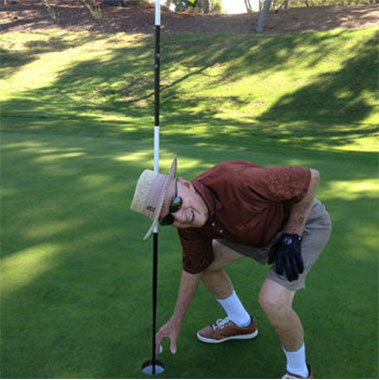
Walter was undoubtedly the top golfer in the world over age 90 for several years. He shot an even par 71 at the age of 87, and a 76 at the age of 92. Shooting 16 strokes under his age on a championship course is at or near the best ever known in golf annals. Beginning with a four-under par 66 at age 67, Walter shot his age nearly two thousand times over the ensuing 30 years. His eleven hole-in-ones included five in five years after age 80. He enjoyed the game at all times, the challenge of every single shot, and worked hard to be the best player he could be throughout his life, up until his final shot. He applied the same passion and focus to his career as a general surgeon. After formally retiring and closing his practice at age 71, he worked full-time for six years on the Navajo Indian Reservation as a surgeon. He also volunteered at medical clinics in Los Angeles and maintained his medical license until he was 95 years old!
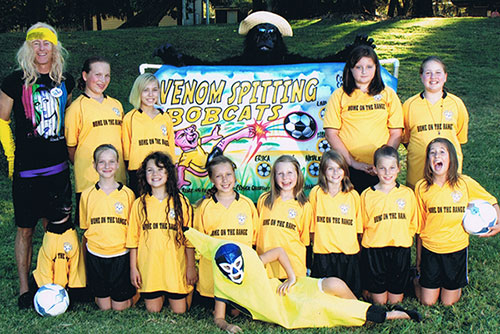
Starting with first graders, I was the clear MVP every year in every sport. Unstoppable, un-guardable, relentless. By the time my son and his buddies reached high school, I’d been caught, passed, and left to clap in the stands. Note to parents: This is just as it should be! Know when to step aside and become skilled at clapping, supporting, and letting your offspring become their own person(s). Be like the caddy on the golf course, handing the requested club to your player but not taking the shots for them! Yes, it was again time to transition and plunge into current athletic passions of Speedgolf, sprinting and high jump. The theme here is to find endeavors that you love, appreciate the process (even if you suck at first), and strive for continued improvement.
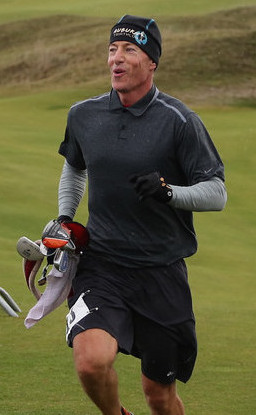
Essentially, my mission is to help you wake up, light up, and get the juices flowing again. Say what you want about my goofy YouTube videos and podcasts calling attention to my morning flexibility/mobility routine, the high jump bar I sail over with a scream of joy, or my Guinness World Record for the fastest single hole of golf ever played (minimum length, 500 yards; I birdied a 503-yard par 5, using one club, in one minute, 38 seconds—a miracle!), but I’m here to be myself, share my enthusiastic message, and make an positive impact on your life. I want to be a leader in the battle against the aforementioned health-destructive influences of the soft and easy life, including the ridiculous marketing hype, flawed science, propaganda, and misinformation shoved down your throat in the health, diet, and fitness scene.
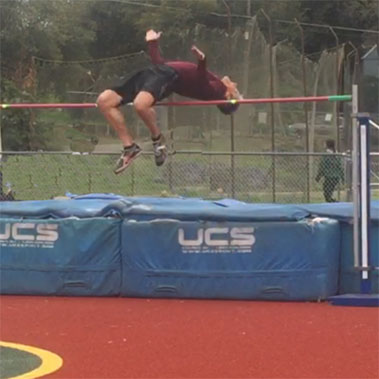
Unfortunately, the evolved ideals and character values communicated by Bannister and Wooden have been pretty much dissed these days, in 280 characters at that. Instead, we proceed with a win at all costs mentality and attach self-esteem to results. Coach Wooden said, “worrying about the scoreboard is a big mistake; focus on the perfect execution of every possession.” Today, the scoreboard indicates that happiness is accessed with consumer luxuries, a kid on the all-star team or the honor roll, or through Amazon Prime (okay, Amazon Prime makes me pretty happy–better than the glitz and marketing propaganda at the shopping mall!).
What’s the problem with obsessing on the trappings? When we succeed with tangible goals, we create outsized egos. When we don’t bring home the gold (nor the silver or bronze), it’s easy to get discouraged, disenchanted and negative. I had to learn the hard way as a young athlete that attachment is not a path to happiness—not just in competitive athletics, but also with parenting, career goals, financial security aspirations, or even healthy relationship dynamics. And while people can often achieve superficial material success with a flawed mindset, it’s also likely to come with a sense of emptiness and negative energy in general. Look no further than the prominent athletes and celebrities with tremendous material success but living train wreck lives.

Finally, because modern life is so stressful and serious, and because posers and manipulative marketing forces and general insincerity lurk around every corner, my message is wrapped and airbrushed in humor, irreverence, and general goofiness whenever possible. As an athlete, husband, parent, content creator, and peak performance motivator, this allows me to bring the most authenticity, vulnerability and {fill in other hot buzzwords} to the table to be the best I can be. Thanks for reading my message. Take a look around the site and see some cool podcasts, videos, books and carefully cultivated favorite products that I believe in and use every day.



By providing your email, you agree to receive newsletters from B.rad. We will never share your email with anyone, ever! Newsletter frequency varies. For more information view our privacy policy here.